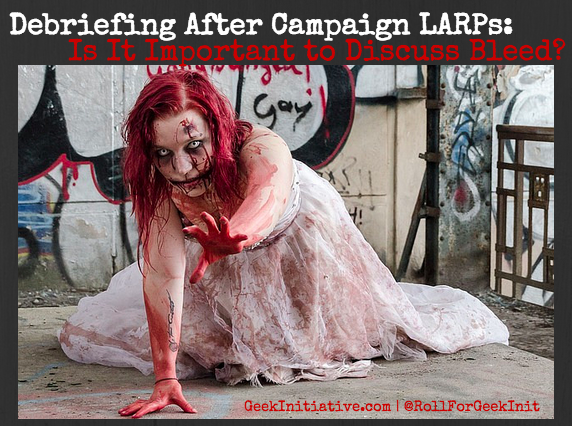When I first heard about the LARP debriefing process, it seemed like something only applied to games in other styles and genres (in contrast to the American fantasy campaign games I typically play). I bought into the hype of thinking of our games as ‘less’ than those in the Nordic scene: less theatrical, less emotional, and less worthy of a formal debriefing process.
I did not initially realize the necessity of debriefing, or the informal debriefing in which I was already participating, and how it could help the games I play. In 2015, I attended Dreamation and participated in a game called “This Miracle,” a two-phase freeform LARP created by Lizzie Stark and Nick Fortugno. Initially, I intended to create a new character for this game, but ended up portraying my main character from my favorite American campaign boffer game.
 Along with the other GMs, Sarah Lynne Bowman walked the participants through a debriefing process following the game. Note: much of what I have to say about debriefing results from reading and watching Bowman’s published material on the topic and from discussing it with her and others after the convention.
Along with the other GMs, Sarah Lynne Bowman walked the participants through a debriefing process following the game. Note: much of what I have to say about debriefing results from reading and watching Bowman’s published material on the topic and from discussing it with her and others after the convention.
My intention is to create an awareness of debriefing, recognition of bleed (positive and negative), and to encourage formal and informal debriefing processes following LARP events. I understand that “American boffer LARP” attempts to encompass a diverse array of games.
My suggestions are based upon my experiences participating in games in and near NJ, USA as a PC, NPC, and staff member and as a general member of our local LARP community. While your campaign LARP may differ from those in my region, my observations and recommendations may still benefit you.
What Is Debriefing?
Debriefing is a process through which LARPers can express and analyze their feelings and emotions about the event, preferably in a neutral, safe environment. For many participants, feeling heard out of game is essential to the debriefing process.
What is Bleed?
Bleed is what occurs when experiences and emotions go from in character to out of character or vice versa. (Read more about bleed here.) This is likely to occur especially in immersive or transformative RP experiences.
Quick examples:
- Jane and Thor are LARPing. Jane’s character kills Thor’s character. Once the game is over, he acts negatively towards her because of what her character did.
- Jane and Thor are LARPing. Jane steals from Thor, and in game he feels very hurt. Out of game, he knows that Jane would not steal from him (even though he suspects she may be able to lift his most prized possession), but he still feels the hurt that his character felt over the theft.
- Jane and Thor are LARPing. Jane finds herself attracted to Thor and they share a kiss. Once the game is over, he finds himself confused over whether he’s feeling his character’s emotions or whether he is interested in her out of game.
An Example of Bleed in American Campaign LARP
I play a character who was well-liked, but who was amidst much personal change. Some of her closest allies were afar, and others were troubled by different situations or personal demons (you know, actual demons and stuff). My character was accused of ‘letting someone die’ and was cut down in the middle of town as punishment.
After the emotionally intense event, I felt very satisfied, relishing the challenge of proving my character’s innocence, value, and commitment to other causes in upcoming months.
Unfortunately, what others deemed out of game as her ‘questionable actions’ created an out of game social climate in which most players avoided me online and in person. I was punished out of game for what my character had been accused of. This concerned me for a few reasons:
- Only a few friends were willing to admit to the bleed as a reason for avoiding me, because in our LARP culture it’s seen as wrong to let the in-game affect the out of game.
- I also had bleed to cope with emotionally, and only one or two of my friends were willing to walk me through it.
- It potentially takes issues like victim blaming and shaming (including slut shaming) out of game. This potentially discourages LARPers from taking risks or experimenting with new styles in what their characters wear or do.
This time period did allow me to form deeper connections with people who play other LARPs, friends who couldn’t attend my home LARP, friends who don’t LARP at all, etc., and that was awesome. But the distance created by in-game events was unfortunate, lingering, and in some cases, semi-permanent or permanent.
How I Perceive and Utilize Bleed
I actively seek positive bleed experiences. I learn best by doing something and then summarizing it in writing. Campaign LARPs give me the ability to consciously repeat positive behaviors every month. This is crucial if I am trying to reinforce a behavior that is not always supported in real life (for example, being a female leader in a patriarchal society). The debriefing process helps me see the value in LARP as an educational tool.
If I lost my character tomorrow, I’d grieve – but the fact that I learned so much by playing her would underscore the value of the entire process.
For me, my characters are based off of an aspect of myself, in LARP or any other type of fiction. The ability to connect to my character in at least one meaningful way is essential to my success in playing her. Does she do things I wouldn’t do? Absolutely. For example, she and I are both very loyal, but she will go to extremes (act without question) if her king commands her. I would not have the capacity to serve someone similarly or follow all orders without questioning.
Since that’s how I connect with my character, I often have to remind myself that the potential murder hobo‘s player may have a dark or devious aspect, but that’s likely only a small part of who she may be.
The Danger of Ignoring Bleed in Campaign LARPs
In campaign LARPs, we sometimes play the same characters for months, years, or even decades. Imagine losing your character after ten years due to character death or game closure. For some reason, many consider this unworthy of being upset about – yet in geek culture, it’s perfectly acceptable for us to get emotional about our favorite comic book character dying, even if we did not create said character.
Because our culture shuns the notion of bleed, especially negative bleed, we often fail to recognize it or admit we feel it. Since it’s ‘wrong,’ admitting that you feel bleed would stigmatize you or even find you labeled as a rule-breaker in some circles.
Without consciously recognizing bleed, debriefing can still be effective. However, it does help if the participants are willing to discuss bleed and agree to refrain from shaming others for it.
Who Should Participate in Debriefing?
Debriefing should not be limited to a specific ‘type’ of LARP participant. It’s something that can benefit participants in any style, game length, or position. You should not feel ashamed to want to talk about a LARP, emotional bleed, reactions and relationships, and more following a game.
Whether it’s your first game or your thousandth, whether your’e a heavy boffer combatant or a roleplay-only kind of participant, debriefing can help you and you should feel able to ask your friends and community for support.
Gender Stigma and Debriefing
In my observation, players who identify as male (or identify towards male on the gender spectrum) often suffer the most from lack of debriefing. This is because our society unfortunately equates emotional behavior with women and weakness, and not behavior for men to exhibit. In this way, feminist attitudes in geek culture and in our gaming communities can and should support men if they wish to be expressive (or if they choose not to be).
All gaming participants have a right to feel how they want to feel and to express post-gameplay feelings. Additionally, a player’s lack of willingness to talk post-LARP should not result in pressure to do so. Some people do not feel comfortable, feel constrained by societal norms – or as been my case, some events are more emotional and bleed-heavy than others, especially within the same campaign game.
The Case for Informal Debriefing for American Campaign LARPs
 In this presentation about bleed and debriefing, Bowman describes positive out-of-game reinforcement of a new player’s roleplaying ability after an intense scene.
In this presentation about bleed and debriefing, Bowman describes positive out-of-game reinforcement of a new player’s roleplaying ability after an intense scene.
After experiencing my first formal debriefing, I realized it had a similar impact of dissecting, discussing, and analyzing each event informally with friends.
This type of informal debriefing is pleasantly rampant in American LARPs. Sometimes I find I have to discuss the same scene a few times before I discern the meaning of it for my character or deal with the emotional impact it had on her, but those who did not share the experience are quick to remind me that this is ‘just a game.’
Compartmentalizing
While I am fairly open about LARPing, this has caused me to compartmentalize my LARP experiences because others see the debriefing process – which can take from one hour to a week for me – as being too involved in a game.
People are quick to appreciate positive self-developments or realization of actual goals in my life (like obtaining a new job or leadership role, losing weight, or being more focused), but they still stigmatize the method I employ to improve myself and understand others (LARP).
If I can find support within the LARP community, safety is increased and stigma is decreased.
Summary
Bleed and debriefing are present in many American campaign LARPs. Because our LARP styles are often seen as inferior forms in the international scene, we may feel that concepts like bleed and processes like debriefing do not or should not occur. However, they can and do have places in our LARPs if we feel a need for them.
[Check back for the next installment about LARP and debriefing: “Suggestions: How To Implement a Debriefing Process at Your Campaign LARP”]
This piece is largely anecdotal and it is far from comprehensive. Do you have comments about bleed and debriefing? Would you like to share your experience? Please leave your comments below.






